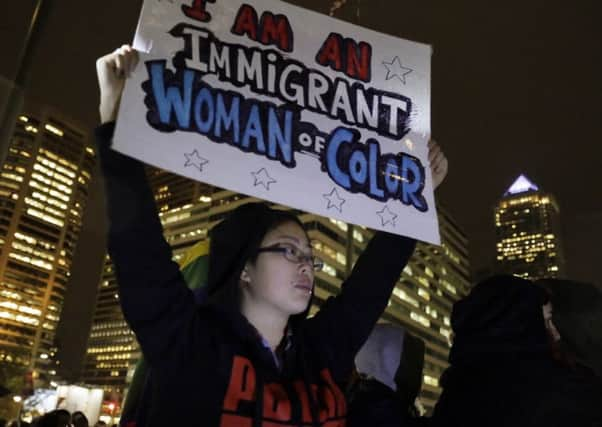YP Letters: Rise and rise of Donald Trump. An era of nonconformist politics


Many dictatorships would not tolerate some of the ugly scenes witnessed before the billionaire real estate tycoon ventured to the White House for transition talks with Barack Obama. Like it or not, he won under the USA’s electoral college which has as many plusses and minuses as the UK’s first past the post system.
As both President Obama, and the defeated Hillary Clinton, made clear with their eloquent speeches following this week’s result, the very nature of the democratic process means there will always be winners and losers, however unpalatable, and that many in the USA – not least dispossessed and working class voters in decayed cities in the so-called ‘rust belt’ – will be relieved that neo-liberalism appears to be at an end.
Advertisement
Hide AdAdvertisement
Hide AdIt’s the same with Brexit on this side of the Atlantic. Politics is changing, long-established political parties and orthodoxies are being challenged by those elements of the electorate which are not prepared to be taken for granted any longer – President-elect Trump’s coarse and often repugnant language exploited this vacuum to the hilt – while the views of many are being increasingly shaped by social media posts.
If anything, this year’s anti-establishment votes – unforeseen by the political classes – are a powerful reminder to people of all ages about the need to become more actively engaged in the political process rather than simply blaming others when the unexpected does happen. For, if anything, recent elections in both the UK and USA have revealed a dearth of statesmanlike leaders with the gravitas and wisdom required to build a broader consensus.
The key lessons
THE new methodology used by the Department for Education and Ofsted makes it even more difficult to ascertain the number of ‘coasting’ schools in Yorkshire. For reasons only known to itself, it has chosen to lump West Yorkshire and Lancashire in one region, align the East Midlands and the Humber together and then create a third entity which has been called the North.
What is known, however, is that standards remains critical to this region’s future prosperity and there’s still much to do despite Yorkshire rising up the Government’s GCSE league tables as a result of changes to the criteria used to assess pupils, teachers and schools alike. Furthermore, the education profession needs to accept a degree of scrutiny, not least so ‘best practice’ can be shared more widely.
Advertisement
Hide AdAdvertisement
Hide AdThat said, Ministers do need to recognise that Yorkshire – and the rest of the North – have not enjoyed the level of resources pumped into London to transform the capital’s schools so their attainment levels are now the envy of the whole country. A government for all, and not just the privileged few, does mean fairer funding for all schools. There also needs to be an acceptance that the Government’s commendably high standards – it’s right that pupils of all academic abilities are stretched – will only be met if there are sufficient teachers with the requisite experience to energise and enthuse. They need to be valued. Disappointingly, the debate about the possible return of grammar schools has detracted attention away from this key lesson, and no amount of statistical jiggery-pokery can mask such an elementary shortcoming.
Armistice respect
IT is to the credit of today’s generation that public participation in solemn events to mark Armistice Day, the silencing of the guns to mark the end of World War One, has grown since the last veterans passed away. Thankfully, this is not because of self-serving politicians or those who have tried to hijack the Royal British Legion’s poppy appeal for their own ends. It’s because there is a greater appreciation of the sacrifices made by those who did survive conflicts like the Battle of the Somme which was being fought to a bloody stalemate 100 years ago.
And, to those who feared that events to mark the Great War’s centenary would be distasteful, the commemorations have not only been dignified and respectful but they have also engaged with youngsters who want to learn more about their ancestors who gave their lives in the name of liberty, the most priceless value of all. As such, the period of silence at 11am will never be more heartfelt or impeccably observed. We will remember them.